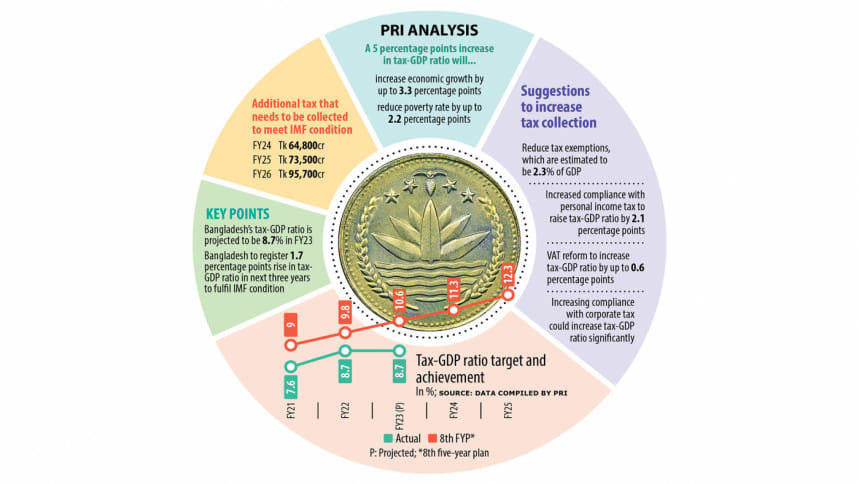Huge tasks ahead for NBR to meet IMF conditions

Bangladesh will have to collect an additional Tk 234,000 crore in the three years from the current fiscal year in order to meet the International Monetary Fund's conditions tagged with its $4.7 billion loan approved last month.
Attaining the target will be very challenging if the National Board of Revenue follows a "business as usual" approach, said the Policy Research Institute (PRI) of Bangladesh, a think-tank based in Dhaka, as it shared the figures yesterday.
The Washington-based multilateral lender attached conditions that Bangladesh will have to increase the tax-to-GDP ratio by 1.7 percentage points to 9.5 per cent at the end of the fiscal year of 2025-26, from 7.8 per cent currently.
The country will have to raise the tax-to-GDP ratio by 0.5 percentage points by FY24 with a subsequent hike of 0.5 percentage points in FY25 and 0.7 percentage points in FY26.
"The target will not be achieved overnight. The goal will remain unachieved with the business-as-usual approach. For this, massive action will be needed," said Ahsan H Mansur, executive director of the PRI, at a press briefing at the office of the think-tank.
Mohammad Abdur Razzaque, director of the PRI Study Centre on Domestic Resource Mobilisation, echoed Mansur, saying: "Achieving the target will be extremely difficult."
The NBR on average registered around 12 per cent annual growth in tax collection from FY19 to FY23. In order to achieve the target set by the IMF, the tax revenue growth needs to be around 18 per cent in FY24, he said.
The IMF projects that the NBR would collect Tk 345,600 crore during the current fiscal year, ending in June.
The tax authorities logged Tk 294,314 crore in revenue in 2021-22, according to finance ministry data.
Razzaque said the NBR has a number of tasks, including IMF's conditions and the promises made by the government to the multilateral agency.
They include establishing compliance risk management units at the NBR customs and VAT wings by December 2023, and developing and adopting a tax compliance improvement plan by the middle of FY24.
The tax collector will also have to adopt a medium-term revenue strategy by the middle of the next fiscal year and implement the strategy between FY25 and FY26, said Razzaque.
Apart from that, the government plans to eliminate less effective tax exemptions and simplify the tax rate structure to broaden the tax base and enhance voluntary taxpayer compliance.
The government also aims to bring more taxpayers into the net by increasing the number of registered taxpayers to one crore by 2026.
"A mere increase in the number of registered taxpayers will not help. It will be a big achievement if the NBR can bring one crore people effectively into the tax net," said Mansur.
With a view to increasing the collection of VAT from the retail sector, the revenue authorities plan to install another 300,000 electronic fiscal devices over the next five years.
As per the plan, the NBR also wants to move toward a modern IT-based administration of the VAT and income tax systems, greater at-source taxation and strengthened compliance risk management.
The PRI said the reduction of tax exemptions, which are estimated to be 2.3 per cent of GDP, could help boost revenue collection.
Similarly, increased compliance with personal income and corporate tax will enable the tax authorities to generate more revenue. Besides, reforms in the VAT system could increase the tax-to-GDP ratio by up to 0.6 percentage points, according to the PRI analysis.
Mansur said a sectoral analysis is necessary on tax exemptions.
"And during the placement of the budget, the NBR should give a statement of tax losses against exemptions. This will bring about transparency and accountability."
The former economist of the IMF, however, backed the continuation of duty benefits for export-oriented industries.
Razzaque said there is a gap in corporate tax collection as many registered companies don't comply with tax rules.
"Bangladesh will have to attain the target to finance its expenses for various purposes. Otherwise, the situation will worsen."
Even if the NBR achieves IMF's targets on revenue, the overall tax collection to GDP will still remain below the goal made as part of the 8th Five-Year Plan, which runs from FY21 to FY25. The government aims to elevate the tax-to-GDP ratio to 12.3 per cent by 2024-25.
"So, there is no scope to be complacent," said Razzaque.
Bangladesh's tax-to-GDP ratio is one of the lowest in the world and the nation's spending for health and education is less than 1 per cent of GDP and close to 2 per cent of GDP, respectively.
"This is below the requirement," said the economist.
"Evidence from cross-country analysis of 139 countries reveals that a country's tax-to-GDP ratio needs to be at least 15 per cent to accelerate growth and development significantly."

 For all latest news, follow The Daily Star's Google News channel.
For all latest news, follow The Daily Star's Google News channel. 



Comments